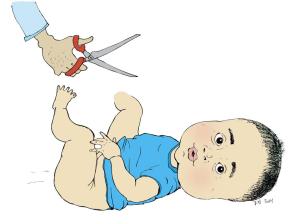
This is part 2 of 3. Part 1 is here. Part 2 is here.
Ταῦτα μὲν οὖν εἰς ἀκοὰς ἦλθε τὰς ἡμετέρας, ἀρχαιολογούμενα παρὰ θεσπεσίοις ἀνδράσιν, οἳ τὰ Μωυσέως οὐ παρέργως διηρεύνησαν. ἐγὼ δὲ πρὸς τοῖς εἰρημένοις καὶ σύμβολον ἡγοῦμαι τὴν περιτομὴν δυοῖν εἶναι τοῖν ἀναγκαιοτάτοιν· ἑνὸς μὲν ἡδονῶν ἐκτομῆς, αἳ καταγοητεύουσι διάνοιαν· ἐπειδὴ γὰρ τὰ νικητήρια φέρεται τῶν ἐν ἡδοναῖς φίλτρων ἡ ἀνδρὸς πρὸς γυναῖκα συνουσία, τὸ ὑπηρετοῦν ταῖς τοιαύταις ὁμιλίαις ὄργανον ἀκρωτηριάζειν ἔδοξε τοῖς νομοθέταις, αἰνιττομένοις περιτομὴν περιττῆς ἐκτομὴν καὶ πλεοναζούσης ἡδονῆς, οὐ μιᾶς, ἀλλὰ διὰ μιᾶς τῆς βιαστικωτάτης καὶ τῶν ἄλλων ἁπασῶν· ἑτέρου δὲ τοῦ γνῶναί τινα ἑαυτὸν καὶ τὴν βαρεῖαν νόσον, οἴησιν, ψυχῆς ἀπώσασθαι· ἔνιοι γὰρ ὡς ἀγαθοὶ ζῳοπλάσται ζῴων τὸ κάλλιστον, ἄνθρωπον, ηὔχησαν δύνασθαι δημιουργεῖν καὶ φυσηθέντες ὑπ’ ἀλαζονείας ἑαυτοὺς ἐξεθείωσαν, τὸν ὡς ἀληθῶς αἴτιον γενέσεως ὄντα θεὸν παρακαλυψάμενοι, καίτοι γε ἐκ τῶν συνήθων ἐπανορθώσασθαι τὴν ἀπάτην δυνάμενοι· πολλοὶ μὲν γὰρ παρ’ αὐτοῖς εἰσιν ἄνδρες ἄγονοι, πολλαὶ δὲ στεῖραι γυναῖκες, ὧν ἀτελεῖς αἱ ὁμιλίαι καταγηρασάντων ἐν ἀπαιδίᾳ. πονηρὰν οὖν δόξαν ἐκτμητέον τῆς διανοίας καὶ τὰς ἄλλας ὅσαι μὴ φιλόθεοι.
(Philo, Peri tōn en merei diatagmatōn 1.8-12)
These are the explanations handed down to us from the old-time studies of divinely gifted men who made deep research into the writings of Moses. To these I would add that I consider circumcision to be a symbol of two things most necessary to our well-being. One is the excision of pleasures which bewitch the mind. For since among the love-lures of pleasure the palm is held by the mating of man and woman, the legislators thought good to dock the organ which ministers to such intercourse, thus making circumcision the figure of the excision of excessive and superfluous pleasure, not only of one pleasure but of all the other pleasures signified by one, and that the most imperious. The other reason is that a man should know himself and banish from the soul the grievous malady of conceit. For there are some who have prided themselves on their power of fashioning as witha sculptor’s cunning the fairest of creatures, man, and in their braggart pride assumed godship, closing their eyes to the Cause of all that comes into being, though they might find in their familiars a corrective for their delusion. For in their mindst are many men incapable of begetting and many women barren, whose matings are ineffective and who grow old childless. The evil belief, therefore, needs to be excised from the mind with any others that are not loyal to God. (tr. Francis Henry Colson)


